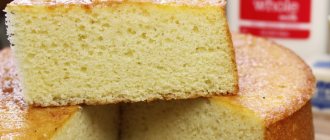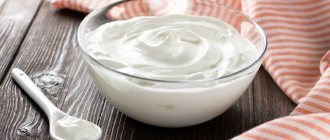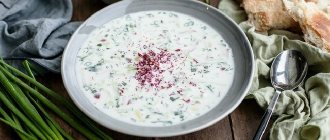Every mother tries to monitor the proper nutrition of her family and maintain the necessary balance of nutrients in the daily menu.
Photo source: leggimigratis.it
Protein deserves special attention - it is the main building material of the human body. The body’s own reserves of this essential component are practically absent - we only get them from food.
That is why protein products should be on the menu every day.
A special place among such products is occupied by Greek yogurt, which contains twice as much protein as regular yogurt. Therefore, this product is rightfully considered a useful addition to the balanced diet of every family.
Greek yogurt can be eaten plain, added to salads, or made into the famous tzatziki sauce. Thanks to its light taste, Greek yogurt can be combined with almost any food, including vegetables, fruits, meat and fish, and can diversify the taste of many dishes.
We offer several original recipes for every housewife to take note of.
Acquaintance
Greek yogurt is a product that has become especially popular in Greece. Today, in this beautiful country, located on the Mediterranean coast, several types of yoghurts are produced, differing in their taste, consistency and degree of health benefits.
One of the varieties of this milk drink, called “Greek yogurt,” is a filtered product obtained by removing the whey from the traditional analogue. The drink has a higher percentage of fat content and a high content of protein and protein.
Greek yogurt is a product that is traditionally made from goat or sheep milk. Today, in mass production, cow's milk is used as the basis for making the drink. The popularity of the delicacy is explained by its low calorie content, as well as the richness of protein and other nutrients.
A global health aid with millions of fans in Europe, the US and Russia, but in Greece many people have never heard of “Greek yogurt”. “What is known as Greek yogurt is called straggisto (thick yogurt) in Greece,” explains Prokopis Ploumbis, a cheese maker in the rural outskirts of Athens. “The secret is the milk,” he adds.
Creamy, protein-rich and low in fat, thick cow's milk yogurt is increasingly sought after by health-conscious consumers. It plays a big role in the Mediterranean diet in the West.
And yet, from a marketing point of view, neither the Greek state nor any Greek company has sought to introduce a patent on the product, unlike feta cheese, which is a protected term in the EU.
No court will accept claims against the use of the phrase “Greek yogurt” when this term is not used even in Greece.
This way the name can be used by anyone.
Turkish entrepreneur Hamdi Ulukaya sensed this opportunity and launched Greek yogurt in the American market under the Chobani brand, which bore the words “Greek yogurt” in large letters.
Meanwhile, a Greek company that began conquering American and European markets decades ago, Fage, listed "Greek thick yogurt" on its packaging, but in smaller print.
In just seven years, Chobani's Greek yogurt became the top-selling yogurt brand in the United States. Thick yogurt now accounts for 35% of the US yogurt market, up from 4% in 2008.
“It was introduced in this country by a Greek company, hence the name Greek yogurt.” It doesn’t matter whether it’s Greek or Turkish yogurt, as long as it’s good yogurt,” says Ulukaya.
Fage fight back.
“Fage are the ones who made Greek yogurt famous throughout the world for its creamy texture, its protein concentration, its rich taste,” says the company’s commercial director, Alexis Alexolopoulos.
But the 88-year-old Athens-based family company, which exports dairy products to 40 countries, eventually conceded defeat in the United States. But they have begun to defend their 95 percent share of the British market.
In the British courts, Fage's main argument is that, unlike Chobani, their yogurt is actually produced in Greece and wins on appeal.
Chobani now markets its yogurt as "thick" in the UK and "Greek" in the US. Fage markets its products in the UK as "real Greek yoghurt".
Thick yogurt is also popular in Greece, where it is a key ingredient in tzatziki. But there are also other varieties of yogurt made from sheep's milk.
Sheep milk yogurt has a fat content of 6.5%, in contrast to milk yogurt - 2.0%.
There are traditional yoghurt farms all over the country serving the rural or island market. Many of these products are consumed locally and never reach the large supermarket chains of Athens.
“Greek sheep graze in the mountains and do not receive any food additives,” says Ploumbis, a Greek cheese maker from Vilia, 60 km from Athens. “The best milk comes in the spring. Animals eat hundreds of varieties of plants, an unimaginable abundance."
Production Features
For those who have ever made cottage cheese or cheese themselves, preparing regular Greek yogurt in your home kitchen will not be difficult. The process is very similar: first the milk is heated (but not boiled: it must retain all the beneficial microelements). Then the starter is added and the whey is decanted. Yogurt or cheese (yogurt) is filtered through a cloth and slightly cooled. Natural Greek yogurt has a dense consistency and resembles yogurt or matsoni. As a result of ripening, no lactose, no whey (milk), or sugar remains in the product.
Greek yogurt
Sourdough "Greek Yogurt VIVO" is intended for home preparation of Greek yogurt.
Filtered Greek yogurt contains high amounts of calcium, approximately 10% of a person's daily value. The protein content in it is also 30-50% higher compared to regular yogurt - this is due to the fact that during filtration the yogurt loses moisture, but does not lose protein and its amount increases in proportion to the loss of moisture.
Live and beneficial bacteria in Greek yogurt help restore intestinal microflora, normalize digestion and strengthen the immune system. The increased protein content, together with the high content of beneficial bacteria, helps speed up metabolism, which is why this yogurt is great for weight loss.
Greek yogurt has a richer fermented milk taste and dense consistency, and special types of bacteria make it even thicker, but not viscous. This is why it is better to eat this yogurt with a spoon than to drink it.
The fermented milk taste of Greek yogurt is more pronounced and rich compared to regular yogurt. But if you like a fresher and softer yogurt, you can prepare the classic “VIVO Yogurt”
Greek yogurt can be consumed immediately after fermentation, but to make it even thicker, it should be filtered.
It is through filtration that it is given a thicker consistency in Greece. The essence of the method is that the yogurt obtained after fermentation is cooled in the refrigerator, after which it is filtered for several hours through a fine sieve, or filter cloth, or through several layers of gauze. As a result of filtration, excess liquid (whey) is removed from the yogurt and the yogurt becomes even thicker. Filter cloth and filter bags can be ordered here.
Filtered Greek yogurt contains more protein, calcium and other nutrients than regular yogurt.
Homemade Greek yogurt will definitely not contain harmful additives such as thickeners and preservatives. You will definitely be confident in its freshness and naturalness, since you prepared it yourself at home.
In the Mediterranean, yogurt is consumed not only as a dessert. It is served with meat dishes for good digestion, and is used as a dressing for salads, soups and other dishes. Sauces are made from it, such as Tzatziki sauce.
Tzatziki appetizer sauce is a traditional Greek dish based on Greek yogurt. And preparing it couldn’t be easier.
Grate the cucumber and squeeze out the moisture from it. Add cucumber, finely chopped garlic and dill to Greek yogurt. Season with salt, pepper and olive oil. Mix well and let it brew for a while. Serve tzatziki with meat and fish dishes, and you can also spread it on bread or dip pieces of vegetables, meat, and seafood into it.
Tzatziki is a healthy and natural alternative to store-bought sauces. Bon appetit!
Watch the video recipe for making Tzatziki sauce on our Youtube channel
Greek yogurt: composition, benefits and harm to health
This fermented milk drink contains live bacteria and also has a high content of magnesium and calcium. Numerous reviews of Greek yogurt by nutritionists rank it as one of the best foods of the century. Its composition is characterized by a number of advantages that have a beneficial effect on human health: it normalizes the functioning of the digestive system, heart, kidneys, strengthens joints, helps prevent infectious diseases, strengthens the immune system, and improves metabolism. Even the serum that has peeled off after pumping is very useful: it is reused in home cooking or cosmetology.
Experts warn that excessive consumption of the delicacy can cause kidney stones due to excess calcium and promote calcification of blood vessels. Another danger is that the store-bought product contains various fillers: jelly, starch, etc., which negates the beneficial effect of drinking the drink.
More details
The product contains exclusively natural ingredients without any synthetic additives. Yogurt is made using a culture of live bacteria: bifidobacteria, lactic acid bacteria, lactobacilli. In addition, experts call this product a real storehouse of magnesium, riboflavin and pantothenic acid. The calorie content of the drink depends on its fat content, but on average it is approximately 66 kcal per 100 g of product.
100 g of yogurt contains:
- sugar 4 g;
- protein 10-12 g;
- cholesterol 6 g;
- The daily calcium intake is 10-15% (absorbed much better than from milk).
You can store high-quality Greek yogurt in the refrigerator for no more than 1 month.
Like them: Greek yogurt and Chobani
News December 29, 2020 13:06
There is Greek yogurt in Russia, and many customers love it. However, it is not nearly as popular as in the US. There, since 2007, sales have grown from several million dollars to 3.7 billion. Chobani, which is now the market leader, became a pioneer in this niche in the United States. In 2007, Greek yogurt was a niche product in the US, accounting for just 1% of yogurts. Now they account for more than half of sales. Sales have already reached more than $3.7 billion and will reach $4 billion by 2020, according to Technavio. It is mainly eaten for breakfast by young Americans under 34 years of age, but 40% of the population buys it periodically. For several years in a row, the production of Greek yogurt has grown by tens of percent per year. For example, from 2012 to 2013, sales increased by 50%, according to Nielsen. During the same time, the market for other yoghurts grew by only 9%. Despite the explosive growth in popularity of Greek yogurt, the largest dairy processors and food manufacturers have long ignored this niche. Thus, Dannon (as Danone has been called in the United States since 1942 to sound better in English) launched its Oikos Greek yogurt brand only in 2010. That same year, General Mills entered this market with its Yoplait brand. That year, Greek yogurt sales grew 162%, according to Statista. Chobani was founded back in 2005 out of an old Kraft Foods plant in New York State. The company was founded by Hamdi Ulukaya, a Turkish businessman of Kurdish origin. His family in Turkey owned a dairy farm where, in addition to cows, they kept goats and sheep. The future businessman came to the USA in the 90s to study, but did not forget about his origins. It was on milk that his first business in the USA was built - his father advised him to import cheese from his farm in the USA. This business was quite successful at first, but after two years of existence it was barely profitable. It was then that Hamdi Ulukaya saw spam in his inbox - an advertisement for the sale of the old Kraft Foods factory and, against all advice, bought it in 2020. He always felt that yogurts in the US were too sweet and watery, so he wanted to start producing the yogurts he ate in Turkey. In the USA they are called Greek. The first employees were former Kraft Foods employees. For a year and a half they experimented with technology and recipes. before releasing yogurt on the market. The yogurt production technologist was hired from Turkey, but the businessman still had to try hundreds of options until he found the taste that seemed closest to home. The company and brand were named Chobani, which means shepherd in Turkish. Greek yogurt has proven to be expensive to produce, requiring three times as much milk as regular yogurts. In addition, due to the lack of technology, I had to experiment for a long time. When the product was finally ready, the company had no money. But there were ideas on how to promote a new product. Chobani did not pay entry bonuses to supermarkets. Moreover, she “paid” for storing her products with yoghurts. The company agreed to pay after the sale of the lot. In addition, due to the lack of money for marketing, Chobani let people try their products for free at special stands in stores. The yoghurts were also advertised for free - with the help of bloggers on social networks. By 2012, the company became the leader in yogurt sales in the United States, and Hamdi Ulukaya himself became a billionaire. Many experts said that in the late 2000s, American supermarkets were actively looking for new products to regain customers who had left during the crisis. Large companies could not offer extraordinary solutions, because they were designed for gradual development. Everyone knows those boring phrases like “big yoghurts” and “milk.”
Comments
POPULAR
Longreads
TOP 6 most dangerous diseases of cows
AUGUST 26, 2020 13:44 Longreads
Which dairy products are in greatest demand in online stores?
AUGUST 24, 2020 10:30 Longreads
Who in the Ministry of Agriculture earned the most in 2020?
14 AUGUST 2020 12:43
Variety of Applications
There are a huge number of different dishes that use this popular fermented milk product: it is added to fish and meat, used as an ingredient for dough, and cocktails and other drinks are created based on it. Greek yogurt is used as a substitute for mayonnaise or sour cream in salads, and as a dressing for sandwiches. In addition, this product is an excellent substitute for marinade: it reduces the fat content of meat and improves its quality and taste. Yogurt is also used as an excellent cosmetic product - for washing your hair and cleansing your facial skin.
Vegetarian's Tear
For a number of reasons, the fermented milk diet is not suitable for everyone. If the acidity of the gastric juice is high, the consumption of such products should be limited.
There is no complete replacement for animal protein and whole milk products. Proteins from plant foods are less digestible than animal proteins. This is not difficult to explain: the cell membranes in plant products consist of fiber, which is almost unchanged under the influence of digestive juices.
Soy, rice, almond milk and other types of similar products made from plant materials are considered milk substitutes. They contain the vitamins and minerals necessary for humans and are certainly healthy, but they cannot compete with whole milk in terms of protein content and quality.
Product Matrix: Yogurt










